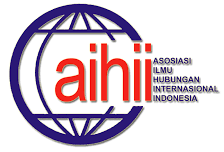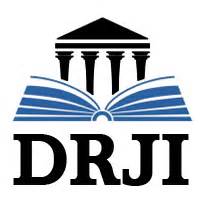Advokasi dan Negosiasi: Diplomasi Hak Asasi Manusia Republik Korea pada Masa Park Geun-hye Mengenai Comfort Women
Abstrak
Kata Kunci
Teks Lengkap:
PDFReferensi
Archer, R. (2011). A Short Reflection On Human Rights Diplomacy. In M. O’Flaherty, Z. Kędzia, A. Müller, & G. Ulrich (Eds.), Human Rights Diplomacy: Contemporary Perspectives (1st ed., Issue October, p. 301). Koninklijke Brill NV.
Asian Women’s Fund. (2002). The “ Comfort Women ” Issue and the Asian Women ’ s Fund Asian Women ’ s Fund. Asian Women’s Fund, 79.
Bull, H. (2012). The Anarchical Society. In The Anarchical Society (4th ed.). Palgrave Macmillan.
Cheongwadae. (2015). Address to the Nation on the Agreement on the “Comfort Women” Issue. Cheongwadae. http://18english.president.pa.go.kr/activity/speeches.php?srh%5Bboard_no%5D=24&srh%5Bsearch_type%5D=2&srh%5Bsearch_value%5D=comfort+women&srh%5Bview_mode%5D=detail&srh%5Bseq%5D=13637&srh%5Bdetail_no%5D=5
Creswell, J. W., & Creswell, J. D. (2018). Qualitative, Quantitative, and Mixed Methods Research Designs. In Fast Facts to Loving your Research Project (5th ed.). SAGE Publications, Inc. https://doi.org/10.1891/9780826146373.0007
Embassy of the Republic of Korea to the Independent State of Papua New Guinea. (2014). Korea’s Position on Japan’s Review of the Details Leading to the Drafting of the Kono Statement. Embassy of the Republic of Korea to the Independent State of Papua New Guinea. http://overseas.mofa.go.kr/pg-en/brd/m_21234/view.do?seq=710278&srchFr=&srchTo=&srchWord=&srchTp=&multi_itm_seq=0&itm_seq_1=0&itm_seq_2=0&company_cd=&company_nm=&page=12
Eppinger, M. E., & Knop, K. (2014). Diplomacy and Its Others: The Case of Comfort Women. SSRN, 23–45.
Etsuro, T. (2013). Proposals for Japan and the ROK to resolve the “Comfort Women” issue: Creating trust and piece in the light of international law. Asia-Pacific Journal, 11(1), 18 pages. http://www.asia-studies.com/asia/JPFocus/3885.pdf
Finnemore, M., & Sikkink, K. (1998). International norm dynamics and political change / Martha Finnemore and Kathryn Sikkink. International Organization, 52(4), 887–917. http://search.ebscohost.com/login.aspx?direct=true&AuthType=ip,url,uid&db=edswao&AN=edswao.388197498〈=fr&site=eds-live
Gunnar, A. (2005). Comparative Colonialsims: Variations in Japanese Colonial Policy in Taiwan and Korea, 1895 ‐ 1945. McNair Scholars Online Journal, 1(1), 11–37. https://doi.org/10.15760/mcnair.2005.11
Haggard, S. (2015). The Comfort Women Agreement | PIIE. North Korea: Witness Transformation. https://www.piie.com/blogs/north-korea-witness-transformation/comfort-women-agreement
Harris, B., & Harding, R. (2018). Japan-South Korea ‘comfort women’ deal under threat. Financial Times. https://www.ft.com/content/2b50b1f2-ed3a-11e8-89c8-d36339d835c0
Ilgit, A., & Prakash, D. (2019). Making Human Rights Emotional: A Research Agenda to Recover Shame in “Naming and Shaming.” Political Psychology, 40(6), 1297–1313. https://doi.org/10.1111/pops.12616
Jeon, S. (2011). The Characteristics of Japanese Colonial Rule in Korea. The Journal of Northeast Asian History, 8(1), 39–74. http://211.250.146.104/files/pdf/jn/jn_013_0020.pdf
Jonsson, G. (2015). Can the Japan-Korea Dispute on Comfort Women be Resolved? Korea Observer, 46(3), 489–515.
Kinzelbach, K., & Lehmann, J. (2015). Can Shaming Promote Human Rights ? Publicity in Human Rights Foreign Policy A Review and Discussion Paper.
Koliev, F. (2020). Shaming and democracy: Explaining inter-state shaming in international organizations. International Political Science Review, 41(4), 538–553. https://doi.org/10.1177/0192512119858660
Le, T. P. (2019). Negotiating in Good Faith: Overcoming Legitimacy Problems in the Japan-South Korea Reconciliation Process. Journal of Asian Studies, 1–24. https://doi.org/10.1017/S0021911819000664
Lee, S. R. (2003). Comforting the comfort women: Who can make Japan pay? University of Pennsylvania Journal of International Economic Law, 24(2), 509–547.
Min, P. G. (2003). Korean “Comfort Women”: The Intersection of Colonial Power, Gender, and Class. Gender and Society, 17(6), 938–957. https://doi.org/10.1177/0891243203257584
MOFA Japan. (2014). Remarks by Prime Minister Abe during the Upper House Budget Session. MOFA Japan. https://www.mofa.go.jp/a_o/rp/page3e_000155.html
MOFA Republic of Korea. (2013a). Deputy Spokesperson’s Press Briefing (Aug. 29, 2013). MOFA Republic of Korea. http://www.mofa.go.kr/eng/brd/m_5679/view.do?seq=312721&srchFr=&srchTo=&srchWord=2013&srchTp=0&multi_itm_seq=0&itm_seq_1=0&itm_seq_2=0&company_cd=&company_nm=&page=4&titleNm=
MOFA Republic of Korea. (2013b). Foreign Minister and US House Asia and Pacific Subcommittee Leaders Discuss the Situation on the Korean Peninsula and in Northeast Asia and Ways to Make a Success of President Park’s Visit to the US. MOFA Republic of Korea. http://www.mofa.go.kr/eng/brd/m_5676/view.do?seq=312213&srchFr=&srchTo=&srchWord=sexual slavery&srchTp=1&multi_itm_seq=0&itm_seq_1=0&itm_seq_2=0&company_cd=&company_nm=&page=7&titleNm=
MOFA Republic of Korea. (2013c). Statement by the Republic of Korea at The 22nd Session of the UN Human Rights Council. MOFA Republic of Korea. http://www.mofa.go.kr/eng/brd/m_5650/view.do?seq=312095&srchFr=&srchTo=&srchWord=comfort&srchTp=1&multi_itm_seq=0&itm_seq_1=0&itm_seq_2=0&company_cd=&company_nm=&page=1&titleNm=
MOFA Republic of Korea. (2013d). UNCAT Calls for Efforts Regarding Japan’s Military Sexual Slavery Victims. MOFA Republic of Korea. http://www.mofa.go.kr/eng/brd/m_5676/view.do?seq=312372&srchFr=&srchTo=&srchWord=sexual slavery&srchTp=1&multi_itm_seq=0&itm_seq_1=0&itm_seq_2=0&company_cd=&company_nm=&page=6&titleNm=
MOFA Republic of Korea. (2014a). Commentary: History Knows Who is Lying, Deceiving People and Whitewashing Truths. MOFA Republic of Korea. http://www.mofa.go.kr/eng/brd/m_5676/view.do?seq=313462&srchFr=&srchTo=&srchWord=sexual slavery&srchTp=1&multi_itm_seq=0&itm_seq_1=0&itm_seq_2=0&company_cd=&company_nm=&page=5&titleNm=
MOFA Republic of Korea. (2014b). MOFA Spokesperson’s Statement on the Outcome of Japan’s Review of the Details Leading to the Drafting of the Kono Statement. MOFA Japan. http://www.mofa.go.kr/eng/brd/m_5676/view.do?seq=313899&srchFr=&srchTo=&srchWord=sexual slavery&srchTp=1&multi_itm_seq=0&itm_seq_1=0&itm_seq_2=0&company_cd=&company_nm=&page=4&titleNm=
MOFA Republic of Korea. (2014c). Statement at the 25th Session of the UN Human Rights Council. MOFA Republic of Korea. http://www.mofa.go.kr/eng/brd/m_5689/view.do?seq=318629&srchFr=&srchTo=&srchWord=sexual&srchTp=1&multi_itm_seq=0&itm_seq_1=0&itm_seq_2=0&company_cd=&company_nm=&page=1&titleNm=
MOFA Republic of Korea. (2015a). Remarks at the Joint Press Availability. https://www.mofa.go.kr/eng/brd/m_5674/down.do?brd_id=15745&seq=319622&data_tp=A&file_seq=1
MOFA Republic of Korea. (2015b). Spokesperson’s Press Briefing (April 30, 2015). MOFA Republic of Korea. http://www.mofa.go.kr/eng/brd/m_5679/view.do?seq=315192&srchFr=&srchTo=&srchWord=sexual slavery&srchTp=1&multi_itm_seq=0&itm_seq_1=0&itm_seq_2=0&company_cd=&company_nm=&page=4&titleNm=
MOFA Republic of Korea. (2015c). Spokesperson’s Press Briefing (January 20, 2015). MOFA Republic of Korea. http://www.mofa.go.kr/eng/brd/m_5679/view.do?seq=314807&srchFr=&srchTo=&srchWord=sexual slavery&srchTp=1&multi_itm_seq=0&itm_seq_1=0&itm_seq_2=0&company_cd=&company_nm=&page=5&titleNm=
Okuzono, H. (2016). South Korean Judiciary Shakes Japan-South Korea Relations (No. 4; 2015—Analysis and Outlook for Japan-South Korea Relations, Issue January 2014).
Pease, K.-K. (2016). Human Rights and Humanitarian Diplomacy: Key Studies in Diplomacy (Scribd e-B). Manchester University Press. https://www.scribd.com/read/421687062/Human-rights-and-humanitarian-diplomacy-Negotiating-for-human-rights-protection-and-humanitarian-access
Reuters. (2018). Japan PM tells South Korea’s Moon that 2015 “comfort women” deal is final. Reuters. https://www.reuters.com/article/us- olympics-2018-japan-abe-idUSKBN1FT06J
Task Force on the Review of the Korea-Japan Agreement on the Issue of “Comfort Women” Victims. (2017). Report on the Review of the Korea-Japan Agreement of December 28 , 2015 on the Issue of “Comfort Women” Victims.
The Constitutional Court of Korea. (2011). 5 . Challenge against the Act of Omission Involving Article 3 of " Agreement on the Settlement of Problem concerning Property and Claims and the Economic Cooperation between the Republic of Korea and Japan " (Vol. 2). http://search.ccourt.go.kr/xmlFile/0/010400/2011/pdf/e2006m788_1.pdf
Tongsuthi, J. L. (1994). “Comfort Women” of World War II. UCLA Women’s Law Journal, 4(2), 413–419.
Yoon, B. L. (2010). Imperial Japan ’ s Comfort Women from Korea : History & Politics of Silence-Breaking. 7(1), 5–39.
Yoon, T. (2011). Historical Animosity is What States Make of It: The Role of Morality and Realism in Korea-Japan Relations. The Korean Journal of International Studies, 9(1), 1–37. https://doi.org/10.14731/kjis.2011.06.9.1.1
DOI: https://doi.org/10.24198/padjir.v3i2.32774
Padjadjaran Journal of International Relations Terindeks Di:







21.png)










